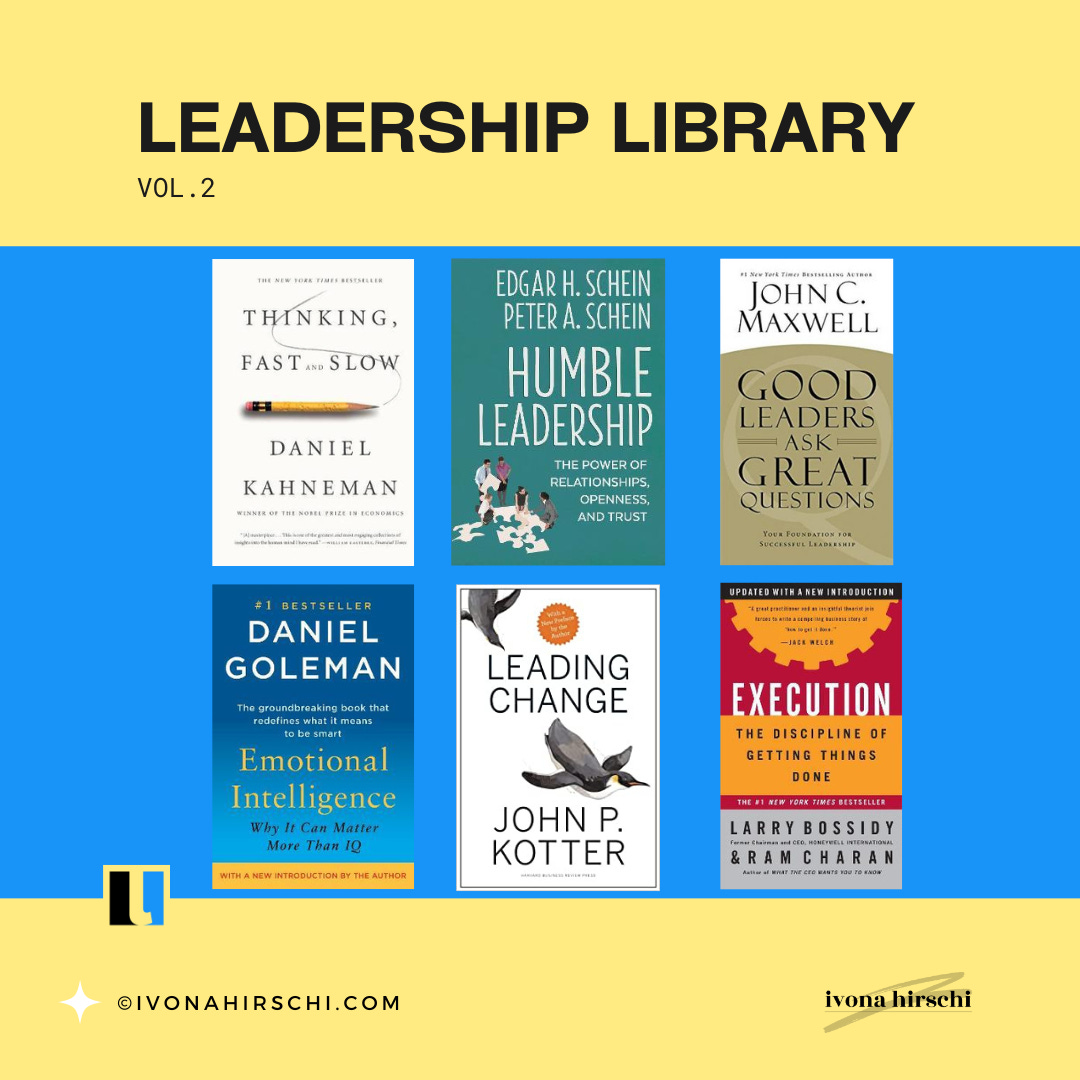6 Books to Grow Your Leadership Skills
Dive into irresistible suggestions.
Q2 is in full swing and so is your leadership journey.
These few interesting books should not slip off your radar. Why should you bother to read them? Because they encourage you to reflect on what you do vs. what you could do better.
No coincidence in this selection. The following are three areas that you need to master:
Understand and improve your decisions
Learn to lead and execute change.
Sharpen your emotional intelligence
Mid-year is coming. You have time to achieve a lot and make a difference. Don’t waste it standing on one foot.
These books will feed your spirit.
Decisions:
1. Thinking, Fast and Slow by Daniel Kahneman (2011)
Uf. Is it really already 12 years since it was published? It feels like yesterday when I first read this book and made a campaign analysis as a manager at my former company.
Daniel Kahneman received the Nobel Prize in Economics. He studied the psychology of judgment and decision-making, which led to this book. The book is filled with research and does not contain any empty hay. It presents two systems by which your brain operates - slow and fast.
Picture: https://www.beapplied.com/
The book includes heuristics and biases aka mental shortcuts. You might discover how lazy you are at making decisions. Kahneman offers a variety of strategies to overcome biases.
Discover how you and others think by reading this book.
2. Good Leaders Ask Great Questions: Your Foundation for Successful Leadership by John C. Maxwell (2014)
John C. Maxwell inspired generations of leaders. You will particularly like this book.
Everyone knows effective communication is the key. But how do you achieve it? Asking questions and listening to answers. If you assume, you might be wrong. If you just listen and observe you may miss critical pieces of a puzzle.
The book is organized into three main sections:
The first section explores the power of asking questions and how it can help leaders be more effective.
The second section discusses different types of questions that leaders can ask, including open-ended questions, reflective questions, and strategic questions.
The third section focuses on specific strategies for developing a culture of questioning within an organization.
Curiosity, learning, and open communication should be emphasized in any team. How is it in yours?
Learn to lead change:
3. Leading Change by John P. Kotter (1996)
Over four decades, Dr. Kotter observed countless leaders and organizations as they were trying to transform or execute their strategies. Change is inevitable. Change is always present. People have trouble coping with change. That is a fact.
Successful leaders guide their people through changes and end up with positive changes. No one said leadership was easy. But it can be if you learn how to lead change. This book offers an actionable framework:
Picture: https://www.kotterinc.com/
Change is necessary. Many teams do not finish implementation and transformation. Hot needle solutions won’t get you far. This is about establishing a vision, collaborating, and empowering your team.
This book is practical and an excellent start to thinking about change differently.
4. Execution: The Discipline of Getting Things Done by Larry Bossidy & Ram Charan (2002)
Discipline is a bit polarizing. Some like it, and others find it overrated. But I really like one fact about it.
EXECUTION
You know endless meetings about projects. You’re talking and talking, and nothing moves forward. Bummer. You almost have to force some people to help or participate in projects. Imagine everyone in the organization taking responsibility for their actions and being held accountable for results.
Bossidy and Charan are from the silent generation who worked with baby boomers, Gen X, and millennials. Execution is a heritage of the past that could be useful even today if you pick up the right pieces.
Sharpen your emotional intelligence
5. Humble Leadership: The Power of Relationships, Openness, and Trust by Edgar H. Schein & Peter A. Schein (2018)
The book explores the concept of humble leadership and presents an innovative leadership model based on building strong relationships, fostering openness, and developing trust.
Hierarchical authority is dead. So what now?
It is your willingness to learn and focus on relationships that help you function in today’s complex and rapidly changing world. It concerns individuals and organizational cultures too.
The book gives you tools to build trust and create a more sustainable model of the work environment.
Humble leaders embrace ambiguity and work to shrink the distance between opposing sides, to achieve a shared commitment built on openness and trust. - Schein & Schein
6. Emotional Intelligence by Daniel Goleman (1995)
Emotions are behind everything. Do you understand why you are angry, frustrated, or annoyed? And did you know you could change such feelings?
Emotional intelligence is not given. It can be taught and cultivated. It is the ability to recognize, understand, and manage one's own emotions, as well as the emotions of others.
Intriguing. Daniel Goleman brings EQ to leadership and organizational effectiveness.
By teaching people to tune in to their emotions with intelligence and to expand their circles of caring, we can transform organizations from the inside out and make a positive difference in our world. — Daniel Goleman
This book has a lot of practical examples. You can learn techniques for improving self-awareness, self-regulation, empathy, and social skills. Highly recommend this book to your reading list!
What are you reading now?
Inspire others and share it with us in the chat :)
See you next week! Ivona





